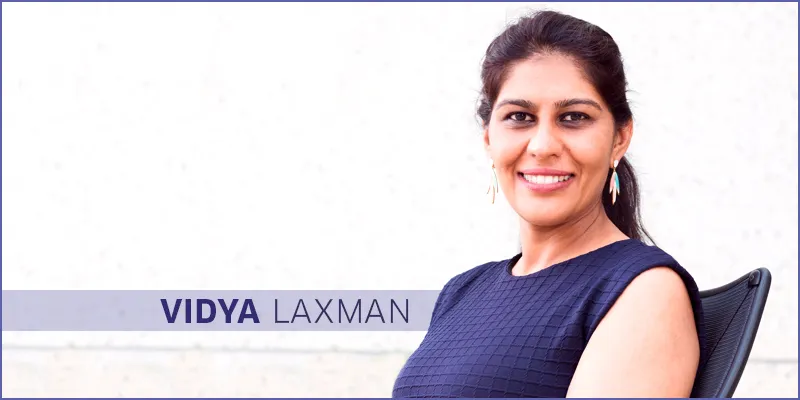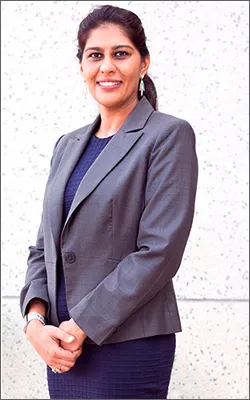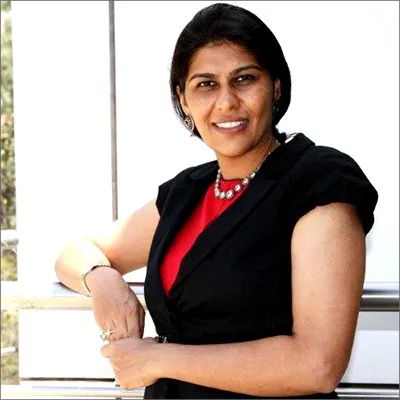From seeing the dawn of Windows to being the director of technology for Tesco, Bengaluru, Vidya Laxman’s journey
It’s a bustling Monday afternoon at Tesco’s sprawling campus in Whitefield. The only technology and operations centre for the British multinational grocery and general merchandise behemoth.
As I wait at the reception, I see a lively woman walking out, rearing to go and support the internal hackathon held at the facility. It seems as if she can’t wait to witness the potential which lies out there.
She greets me and chooses to take the stairs, rather than taking the lift. The sign I interpret of a woman who has always been a go-getter throughout. She laughs and says she needs to do her active rounds of fitness while her colleagues joining us for the meeting reach at the same time as us through the lift.

On the way up, she asks me with humility about my background and upbringing. And for that very instance I forget that she is one of the forerunners of driving organisational change and implementing the next new technology which might disrupt the retail segment in India.
Vidya Laxman is the Director of Technology at Tesco, Bengaluru, and is currently the Co-Chair for Anita Borg Institute (Grace Hopper) – women in technology.
Her tryst with technology
It was 1989 when Vidya started her tryst with technology by enrolling herself for computer science engineering. At a time, when technology was not a preferred domain for women in the country, Vidya chose to break the odds.
She credits her brother and father for her acumen in technology. Her brother seemed to always have a technical mind where he would break open things, while Vidya would find solace in putting them back together.
She reminisces that era – the dawn of Windows which was just coming on board, and having a computer was a novelty. Being one of first women in the batch of men at RV College of Engineering, she recalls that out of a batch of 3,000 there were only 54 women. Out of which 18 of them were in computer science.
Bursting out in loud laughter, she says that maybe her father felt safer to enrol her to that particular stream. However, she doesn’t forget to pat her back for the analytics and love for mathematics she still holds. For me, a sign of a woman, who is aware of where she stands today.
Coming from an army background, she tries to relate it with her upbringing, narrating how growing up at multiple places gifted her with the agility in disruptiveness; allowing her to respect different people and cultures.
She equates that to technology as a sector where change is constant. Her upbringing has helped her to not be overwhelmed, surprised or shocked by change. She finds a familiarity with change, but on looking around, feels change is regarded as a negative connotation. She describes the process of uprooting herself and starting all over new in different scenarios, as her biggest drive in the world of technology.
Shifting from couch-based strategy to cloud to Internet of Things, she runs into all these things with the curiosity to know more. Vidya tells us that she applies the same while hiring individuals for her team where she looks more at the aptitude and attitude while concentrating the curiosity gene.
Today, this power house loves the ambiguity associated with technology, disrupting and providing the power of democracy to individuals.
On diversity inclusion
As an individual today, Vidya is quite vociferous about the diversity initiatives and is seen to be quite a known face to speak at NASSCOM’s Diversity Summit. She was also the Chief Operating Officer at ThoughtWorks before joining Tesco, which is considered to be a forerunner in pushing initiatives for better diversity inclusion at workplaces.
But Vidya relates this to her personal life
“What I didn’t have while I was growing up and completing my engineering was a woman leader who I could look up to. When going to conferences I saw only men speaking.”
To eradicate this void, Vidya as an individual has taken this as her personal battle to fight. While, seeing a computer science stream at an engineering college filled with 50 per cent women, she asks whether we have moved the needle much? She, herself answers by saying not much. Why? According to her, there is again a drop in the number of women after five years of work experience wherein they are expected by their families.
Vidya says that while starting her career she was the only women in a group of 20 men and still continues to the only women in the management position. But apart from being a technologist one can see Vidya to be an eternal optimist where she says there is hope for change.
“Somewhere behind at the back of their head, managers always have that Oh! She’s going to start a family. But I think I played a very essential role of being there and putting up my hand even at my eight month of pregnancy for a role. And the organisation saw my commitment and chose to help me.”

Moreover, this director of technology also notices that when women get into pregnancy they have a guilt factor of not giving much importance to their child. Thus, they start getting disengaged. Therefore, she believes that both individuals have a role to play. One, the organisation which needs to have an open mind, counselling these people, and helping them through the process, while second is the employee who needs to be educated about changing their perceptions and being open-minded.Being vocal, she also advises women to ask for what they deserve. Vidya thinks that the problem with women is that they never ask. It becomes a matter of embarrassment for them. Obviously with exceptions, she also believes that another thing which women don’t do is the credit for the good work they’ve ensued, thinking it to be pompous. Narrating a personal incident, she says
“At Evergreen investments, there was this opportunity that I was gearing towards. And I presumed that my manager knew that when that position opens up I will get it because I was pacing towards it. But I never went and spoke about my ambition leaving my work to speak for it. When she spoke to the manager, he says he never knew. We can’t expect managers to have telepathy, can we?”
The Vidya that she is today
When we asked, whether it was difficult to reach the stature she has achieved today. She comments that her candidness was her greatest difficulty. “It is all the way more difficult for a woman to be candid. People can’t handle that. As Sheryl Sandberg said, the minute you are aggressive and ambitious, the term ‘bossy’ comes in. I’m being politically correct here, there is another word with B which is far more used for an ambitious women,” she says.
Crediting herself, she believes that her name is quite high on integrity, as well. “I never give up and always want to win.”
However, she agrees that Vidya did think of quitting once.
“In 2001, I was in my seventh month of pregnancy and had gone in for an interview .It was my dream job and was really keen to join them. But I didn’t get in because I was pregnant.”
She had aced all rounds and had a great final interview, but as soon as she told them that she was pregnant, they put her position on hold.
“I was really heartbroken and the company which I was working for chose to shut down. Basically, I was laid off. And had decided to take a break and not really work.”
But a conversation with her dad changed her thoughts about the same.
“My dad asked me, what I would want my children to think of me. That got me thinking. Even my mother, who is my inspiration was really shocked and taken aback by my decision of giving up. Being married to a military official, my mother said if she could work how couldn’t I, even after not having any constraints.”
She says that even her in-laws were ready to shift to the US to take care of the kid, so she could focus on her career. Thus, she believes that the support system is very important.
Inspiration
Like most women, Vidya prizes her mother as her source of inspiration. She says having married an army official; it was tough for her to pursue her career. Looking at the ease at which her mother gave away everything to nurture them really inspires Vidya. Nonetheless, Vidya’s mother is a triple majors and defines what an ambitious women really needs to be.
Her mother till today teaches community kids which stands as an example of giving back to society, for Vidya. This really ranks high in her priority of things, as an individual.
The technologist
Spearing the analytics division at Tesco, Vidya today puts her bets on technologies revolving around Machine to Machine learning, Internet of Things, and Data Mining. She believes that major companies are mining data, but the company which knows how to use it well will be the real winner, moving forward.

Looking at India as a melting pot of opportunity, she says“India is doing fantastically well in the startup community and I admire the ability of the younger generation to take risks. They go for shaping their passions and chasing their dreams, which I admire about them.”
She thinks that India as a society has started to give second chances, making it easy for one to move from any profession to another.
However at the end, the bottom line for this tycoon is what one gets to the table.
“It is not just about having the capability, the drive, and ability to execute. But about being the complete package. I ask myself as to what I bring to the table? And I think that would be that people can talk or relate to me and approach me with their problems. As a technologist, it is not much about technology, but rather about the business perspective. It is more about what is the Return of Investment a certain technology can give you. And I get that to Tesco. For me, it is how well an entity can use technology to have an impact. On business, community, or others.”
But being the role model that she has been to many, Vidya doesn’t stop to inspire me even as we come to an end of the conversation. Rather the respect reaches higher as she leaves a message to the budding women entrepreneurs out there
“I think women bring empathy, resilience, a different perspective and a great sense of humour in board rooms. What I would like to tell to women who are starting up with a different challenge every day is to not take life so seriously. Women think they’re superwoman but shouldn’t expect perfection in everything they do. They need to believe in what they’re doing and ask for what they want. But most importantly, they never should stop learning.”
But when one looks at Vidya one would definitely believe that in certain ways, yes, women do rule the world!







